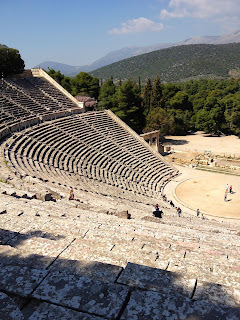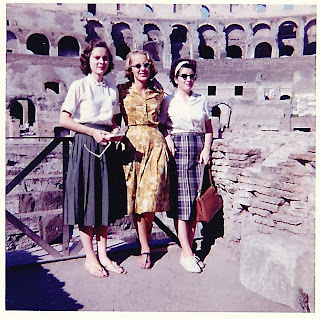narrative
∞
When You Come Home From Studying Abroad
It being the end of our January term, Augustana College students have just returned from studying abroad in Thailand, Cuba, India, New Zealand, touring Europe, and elsewhere. We place a high value on study abroad, because when you return, you can never see the world the same again.
We think that when Americans study abroad, that's good for the whole world because it helps Americans to see America as they could not see it otherwise.
Of course, it's not without its costs. Our students who have just come back are jetlagged and road-weary. Many are a little deeper in debt. And the new term is about to begin.
That being the case, let me offer some advice to those of you who are returning from studies abroad. I know you're tired, so I'll be brief:
1) Get some rest. Stay up until it's dark out, and then sleep deeply. Get back in sync with the sun on this side of the world.
2) Journal every day. Trust me. Do this. Do it now. Don't put it off. Your memories are already fading. Get it down. Write however you want - impressionistically, narratively, whatever. Write about all five senses. Write about language. Write about the people you were with, and write their names down. Write down names of places, hotels, restaurants, museums. Do it now. Go.
3) Tell stories. To anyone who will listen. Storytelling is one of our oldest and best ways of sharing our experiences. Enrich your classmates and professors who couldn't join you. Tell us what you saw, what surprised you. Tell us anecdotes about specific times, places, meals, people, vehicles. Give us detail. As you do, you will nourish your own memories, and you'll sort out what matters most to you. As Umberto Eco once wrote,
4) Come up with a couple of one-liners. This is how to prepare for the inevitable question, "How was India?" If you say "It was amazing!" the conversation is over and the opportunity is gone. Instead, try something like "I never had food like the food I had in Delhi!" or "I wish you could have seen the quality of the rivers" or "The best day was the fourth day." If the questioner was just being polite, that will satisfy them. But these specific memories, offered as one-liners, are invitations to further conversation. They are a way of saying "Would you like to know more?"
You had a great experience. Some of it was wonderful, some was no doubt very difficult. This is why we go. Now, you've brought it home. Do what you can to preserve the memories, and to share them with the rest of us.
So welcome home! And now, go get some sleep. (And then you can read Part Two of this post.)
 |
| Epidauros |
We think that when Americans study abroad, that's good for the whole world because it helps Americans to see America as they could not see it otherwise.
Of course, it's not without its costs. Our students who have just come back are jetlagged and road-weary. Many are a little deeper in debt. And the new term is about to begin.
That being the case, let me offer some advice to those of you who are returning from studies abroad. I know you're tired, so I'll be brief:
1) Get some rest. Stay up until it's dark out, and then sleep deeply. Get back in sync with the sun on this side of the world.
2) Journal every day. Trust me. Do this. Do it now. Don't put it off. Your memories are already fading. Get it down. Write however you want - impressionistically, narratively, whatever. Write about all five senses. Write about language. Write about the people you were with, and write their names down. Write down names of places, hotels, restaurants, museums. Do it now. Go.
3) Tell stories. To anyone who will listen. Storytelling is one of our oldest and best ways of sharing our experiences. Enrich your classmates and professors who couldn't join you. Tell us what you saw, what surprised you. Tell us anecdotes about specific times, places, meals, people, vehicles. Give us detail. As you do, you will nourish your own memories, and you'll sort out what matters most to you. As Umberto Eco once wrote,
"One who tells stories must have another to whom he tells them, and only thus can he tell them to himself."*And perhaps most importantly,
4) Come up with a couple of one-liners. This is how to prepare for the inevitable question, "How was India?" If you say "It was amazing!" the conversation is over and the opportunity is gone. Instead, try something like "I never had food like the food I had in Delhi!" or "I wish you could have seen the quality of the rivers" or "The best day was the fourth day." If the questioner was just being polite, that will satisfy them. But these specific memories, offered as one-liners, are invitations to further conversation. They are a way of saying "Would you like to know more?"
You had a great experience. Some of it was wonderful, some was no doubt very difficult. This is why we go. Now, you've brought it home. Do what you can to preserve the memories, and to share them with the rest of us.
So welcome home! And now, go get some sleep. (And then you can read Part Two of this post.)
 |
| My mother in Rome during her college years. |
*****
*Umberto Eco, Baudolino, (New York: Harcourt, 2002) p.
207.
∞
Wettstein on Narrative Theology
I have occasionally written about theology and theomythy in this blog. And in my book From Homer To Harry Potter my coauthor and I attempted a longer defense of the idea that the heart of the Bible is not propositional theology but narrative theology and storytelling. I am right now working up a review of a marvelous book by Howard Wettstein (the picture on his home page is worth a thousand words) entitled The Significance of Religious Experience. His book is thought-provoking and illuminating -- I'll save the details for the full review -- but for now, let me offer two helpful quotes.
“We often speak of the biblical narrative, and narrative is another aspect of the Bible’s literary character. The Bible’s characteristic mode of ‘theology’ is story telling, the stories overlaid with poetic language. Never does one find the sort of conceptually refined doctrinal propositions characteristic of a doctrinal approach. When the divine protagonist comes into view, we are not told much about his properties. Think about the divine perfections, the highly abstract omni-properties (omnipotence, omniscience, and the like), so dominant in medieval and post-medieval theology. One has to work very hard—too hard—to find even hints of these in the Biblical text. Instead of properties, perfection and the like the Bible speaks of God’s roles—father, king, friend, lover, judge, creator, and the like. Roles, as opposed to properties; this should give one pause.” (108)
I will confess that this is a difficult review to write; it's rare that I find a book that I'd rather quote at great length rather than summarize. His writing is lucid, combining analytic rigor and pragmatic vision with Talmudic wisdom. It is delicious in its suggestiveness. It's the sort of book I expect will tinge everything I write for a long time.“Biblical theology is poetically infused, not propositionally articulated.” (110)